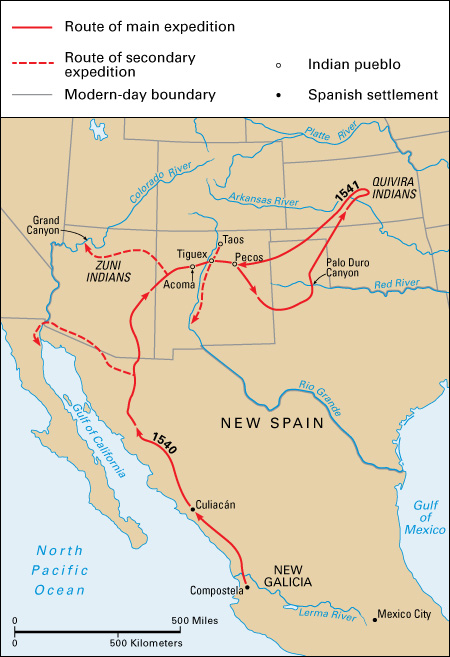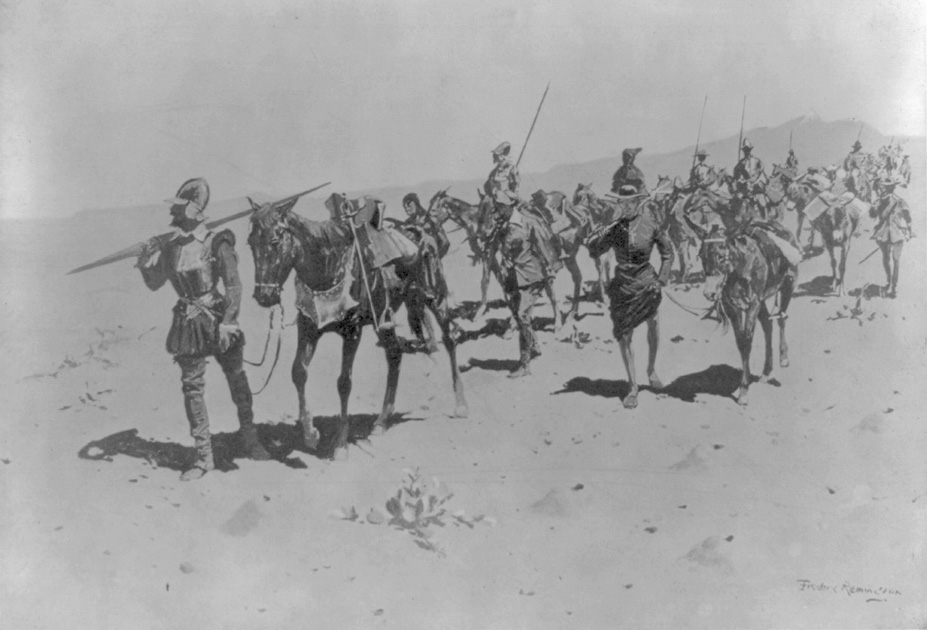Coronado, Francisco Vásquez de (1510?-1554), was a Spanish explorer. From 1540 to 1542, he led an expedition to the American Southwest in search of the legendary Seven Cities of Cibola. Earlier Spanish explorers had told of these cities, which were said to be rich in gold and other treasures.

Coronado was born in Salamanca, Spain. In 1535, he sailed to Mexico with Antonio de Mendoza, the first viceroy of New Spain, which included what is now Mexico. Coronado became governor of New Galicia province, northwest of Mexico City, in 1538.
In 1539, Marcos de Niza, a Spanish missionary priest, returned to New Spain from a journey to the north. He claimed to have seen a golden city, Cíbola, among the Zuni Indians in the region. Niza’s account and stories by Álvar Núñez Cabeza de Vaca and other Spanish explorers led to Coronado’s Cíbola expedition.
Coronado gathered his army in Compostela, the capital of New Galicia, at the end of February 1540. He recruited more than 300 Spanish soldiers and over 1,000 Indian soldiers and servants, many of whom were accompanied by their wives and children. Several missionary priests also went with the expedition.

In July, Coronado reached the place he identified as Cíbola, in the area of what is now Gallup, New Mexico. The Zuni Indians there fought to defend their territory, but the Spaniards defeated them and established a camp at the site. To the Spaniards’ bitter disappointment, the town they thought was the legendary Cíbola was not a golden city. It was instead a small village called Hawikuh, which was inhabited by about 100 families.
From his base camp, Coronado sent smaller bands of soldiers under the command of others to explore to the west and the east. One of his men, Pedro de Tovar, led a force to the Colorado Plateau and the Painted Desert to the northwest. Garcia López de Cárdenas and his party became the first Europeans to see the Grand Canyon. Hernando de Alvarado explored the Rio Grande Valley.
In the winter of 1540, Coronado moved his headquarters near a cluster of about a dozen Pueblo Indian villages in a region called Tiguex, which was north of present-day Albuquerque, New Mexico. The winter brought shortages of food and clothing. After the Spaniards took supplies from the Pueblo by force, the Indians began to resist the Spaniards. In the war that followed, Coronado’s army destroyed several villages.
The following spring, tempted by new stories of a city of gold called Quivira, Coronado led an expedition eastward across the Pecos River. He wandered through the panhandles of present-day Texas and Oklahoma and eventually reached what is now central Kansas before returning to New Mexico in the fall.
In the spring of 1542, Coronado returned to New Spain. He remained governor of New Galicia until 1544. That year, he was suspended from his office during an investigation of his Cíbola expedition. In 1545, Coronado was charged with mistreatment of Indians, failure to colonize the lands he had explored, and other misconduct. In 1546, he was cleared of all wrongdoing. He died on Sept. 22, 1554.
